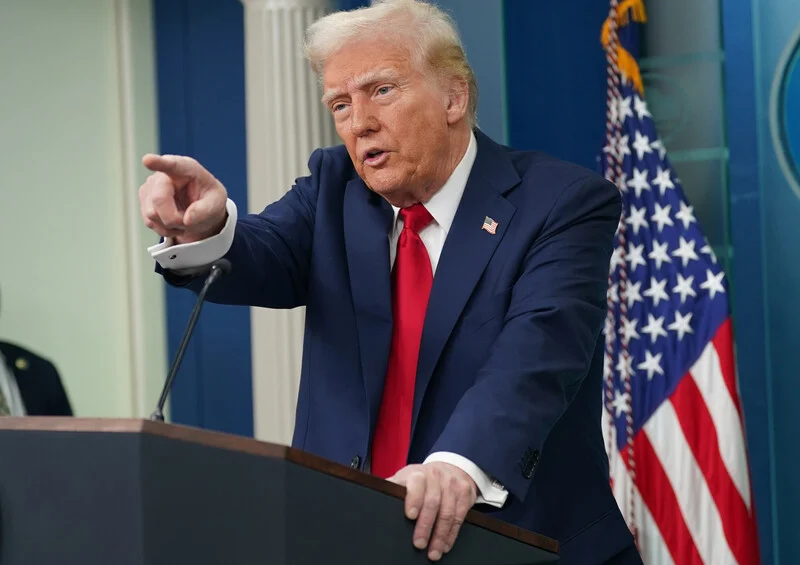-
Gaza is not a “thing,” Mr. President

Late last month, President Donald Trump raised the prospect of ethnically cleansing the Gaza Strip. (UPI)
It seems that neither Israel nor the US is willing to leave us, the people of Gaza, to exist in peace. Even after the announcement of a fragile ceasefire in the genocidal war perpetrated by the Israeli colonial occupation – backed by American support and brokered with Egyptian and Qatari guarantees – US President Donald Trump made yet another deeply contentious declaration. He proposed to “clean out that whole thing,” suggesting the relocation of “a million and a half” Palestinians to neighboring countries like Jordan and Egypt, framing it as a so-called humanitarian solution.
I read his words twice, trying to grasp the full weight of what he meant by “thing.” It was unmistakable – he was referring to Gaza itself, a land that is home to over two million people who have endured decades of siege, bombardment and forced displacement. To Trump, Gaza is not a place of life, history and resistance but an obstacle to be erased, its people reduced to a problem for the US’ favorite spoiled child to “solve.”
Describing a phone call with Jordan’s King Abdullah II, Trump called Gaza “a real mess” and said that he urged King Abdullah to take in more Palestinians. He suggested the new arrangement could be temporary or long-term for the displaced, claiming it would allow them to “live in peace for a change.”
“I’d like Egypt to take people, and I’d like Jordan to take people,” he said. However, both Egypt and Jordan rejected the proposal to relocate Palestinians from Gaza.
This isn’t new. Trump views Gaza not as a homeland but as a real estate problem to be solved. He recently called it a “phenomenal location,” yet at the same time likened it to a “massive demolition site.” His words echo those of his son-in-law, Jared Kushner, who spoke last year of Gaza’s “valuable” waterfront property as if it were prime land for redevelopment – once its people were conveniently erased.
Defiance and despair
In Gaza, Trump’s proposal was met with both defiance and deep concern. Some dismissed it outright, refusing to take his words seriously, especially after the Israeli military withdrew from most areas of the coastal territory, allowing residents to return to their devastated neighborhoods in northern Gaza. The general sentiment voiced in Gaza was that if they didn’t leave during the bombardments, when the pressure to abandon homes was at its peak, why would they leave now, after the killing has paused?
Others, however, saw his statement as a warning that Gaza’s reconstruction might be deliberately stalled, making it uninhabitable and forcing its residents to leave. Even without direct military action, another kind of war continues – one of deprivation. Severe restrictions on food, medicine, water and fuel have made daily life a battle for survival. Hospitals struggle to function, families wait in endless lines for clean water, and frequent power cuts plunge entire neighborhoods into darkness.
If these conditions persist, staying in Gaza may become an unbearable choice. Parents will face the excruciating decision of watching their children suffer from hunger and illness or leaving behind their homeland. Humanitarian aid – already a lifeline for survival – could be weaponized, conditioned in ways that push for relocation under the guise of necessity. What bombs failed to achieve, creeping desperation might.
Although Egypt and Jordan have so far resisted such proposals, diplomatic efforts could lead to pressure on them to accept Palestinian refugees as part of an international peace settlement.
A long history of forced displacement
On 11 October 2023, when US official John Kirby spoke of “safe passage” for Gazans to flee, my father, sitting in our living room, turned off the radio in disgust. His face darkened, and he waved his hand dismissively. “We will not leave,” he said firmly, as if addressing Kirby himself – or the forces behind the relentless cycles of displacement that have haunted our people for generations.
My father often spoke of his grandfather’s exile in 1948 – the lands lost, the painful separation from his father after the 1967 war. When my grandfather left to work in Egypt, he was never allowed to return. These were not isolated stories but part of a long history of displacement, of families torn apart, of promises broken.
He told me of the 1970s: the expulsion of families from Jabaliya refugee camp when the Israeli military marked the homes of freedom fighters with an X, giving them just 48 hours to leave before their houses were destroyed. Other homes were demolished under the pretext of widening roads – another tactic of forced displacement. One of those families was the Daouds, my father’s neighbors, who came to say goodbye before being forced to Al-Arish in Egypt, uncertain if they would ever return.
This strategy of expelling Palestinians from Gaza is not new. In 1953, a plan negotiated between Egypt and UNRWA, the UN agency for Palestine refugees, aimed to relocate 60,000 refugees from Gaza to Sinai, backed by $30 million in UNRWA funding. By 1955, as Israeli military raids escalated, the plan gained momentum – but mass protests forced its cancellation.
In 1956-57, Israeli finance minister Levi Eshkol allocated $500,000 to finance the departure of 200 Palestinian refugee families from Gaza. By 1969, Israeli officials were considering measures to lower Gaza’s standard of living vis-à-vis the West Bank in order to encourage out-migration. Under Ariel Sharon’s military command in 1971, Israel destroyed thousands of homes and deported 12,000 civilians to Sinai, many of whom were placed in the “Canada Camp” near the Egyptian border, where they lived in limbo for years. These policies were part of a broader strategy to fragment Palestinian society, reduce the refugee population, and eliminate their political identity, continuing the long history of displacement in Gaza.
Such policies have long shaped Palestinian awareness, reinforcing a collective understanding that displacement is not incidental but deliberate. This is why so many in northern Gaza refused to move south during the recent genocidal war, recognizing the latest so-called evacuation orders as part of a familiar strategy of forced transfer. They knew this wasn’t just about escaping bombardment – it was about resisting erasure.
Similarly, in the south, despite relentless pressure and violence, many chose to remain rather than risk becoming part of another wave of forced exile. They never once considered crossing the border into Egypt. Resistance in Gaza has never been just an individual act; it is a collective stand against a history that demands repetition.
Gaza is not a “thing”
Western colonial powers have long viewed Gaza, and Palestinians more broadly, not as a people with history, culture and agency, but as a population to be controlled, discarded or managed. To them, we are human animals, marginalized and expendable, to be displaced, starved and erased without consequence. Trump’s words – reducing Gaza to a “thing” to “clean out” – are not an anomaly but a clear reflection of this dehumanizing mindset.
Yet history proves them wrong. Gaza is not an object of policy or a mere crisis zone. It is alive with flesh and blood, a land of resistance that has defied every attempt to erase it. Those labeled as refugees have dismantled even the most sophisticated colonial strategies. The people deemed powerless have continuously disrupted the occupier’s best-laid plans.
What we have endured is not just another war or humanitarian catastrophe; it is a systematic effort to break and erase us. And despite everything, they failed. Our losses are immeasurable – great people, entire families, homes, streets and histories etched into the walls of our cities. Dreams and futures have been stolen. But when we saw people return to their destroyed homes on 27 January 2025, stepping over ruins and sifting through the wreckage, it proved that our bond with this land is unbreakable.
As Gaza has thwarted previous plans of forced transfer, it will thwart the current one as well. A place home to mostly Palestinian refugees expelled in 1948 will forever haunt Israel as a curse. And just as Palestinians in Gaza have returned to their northern ruins, one day, they will return to their original hometowns.
This great return march speaks to a deeper truth that even the most powerful armies must now confront. Against advanced weaponry, AI-driven warfare, missiles and an arsenal designed to crush them, the so-called poorest and most marginalized have stood their ground.
Gaza will never return to what it once was – a truth we cannot deny. Perhaps what lies ahead will be even harder, perhaps another war is already forming. But one certainty remains: Our connection to this land is stronger than any force that seeks to sever it. Israel does not understand us. Neither does the United States. For there is a fundamental difference between belonging to a land and occupying it. They believe control comes through domination. We know that true belonging is unbreakable.






Login or Register to Leave a Comment